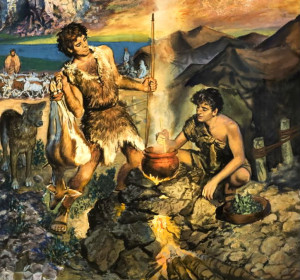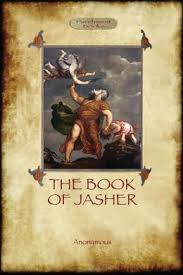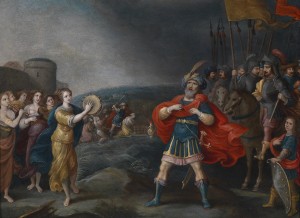Did God really “hate” Esau? This question was recently posed to me by a godly woman in my congregation.
For those of you who may be unfamiliar with the story of Esau, let me fill in a few details (Note: You can read the whole story for yourself in Genesis 25–36.)
Esau was the oldest twin brother of Jacob. Esau was the favorite of his father, Isaac, and Jacob was the  favorite of his mother, Rebekah. But even before they were born God told Rebekah,
favorite of his mother, Rebekah. But even before they were born God told Rebekah,
“Two nations are in your womb,
And two peoples from within you shall be divided;
The one shall be stronger than the other,
The older shall serve the younger.”
Genesis 25:23
Esau would ultimately sell his birthright to Jacob for a bowl of stew (Genesis 25:29–34), and later Jacob would deceived his father so as to receive Esau’s blessing (Genesis 27). Did Esau get the raw end of the deal?
To the untrained eye this story reads like a transcript from the Jerry Springer show. But thankfully, for our sakes, God in his grace interprets the story for us.
In Malachi 1 we read these words,
“‘I have loved you,’ says the Lord. But you say, ‘How have you loved us?’ ‘Is not Esau Jacob’s brother?’ declares the Lord. ‘Yet I have loved Jacob but Esau I have hated.’”
Malachi 1:2–3a
Those are strong words, but they still don’t, by themselves, help us understand what is going on. So the Apostle Paul, under the inspiration of the Holy Spirit, wrote these words in Romans 9,
6 But it is not as though the word of God has failed. For not all who are descended from Israel belong to Israel, 7 and not all are children of Abraham because they are his offspring, but “Through Isaac shall your offspring be named.” 8 This means that it is not the children of the flesh who are the children of God, but the children of the promise are counted as offspring. 9 For this is what the promise said: “About this time next year I will return and Sarah shall have a son.” 10 And not only so, but also when Rebecca had conceived children by one man, our forefather Isaac, 11 though they were not yet born and had done nothing either good or bad—in order that God’s purpose of election might continue, not because of works but because of his call— 12 she was told, “The older will serve the younger.” 13 As it is written, “Jacob I loved, but Esau I hated.”
Romans 9:6–13
Finally in this passage we begin to understand the reason why “the older shall serve the younger.” We begin to understand why God said, “Jacob I loved, but Esau I hated.” The context here in Romans is clear. The context is God’s free and sovereign choice in electing those whom he chooses to elect—not based on any foreseen merit in them, but purely based on his sovereign freedom.
This passage from Romans is part of a larger argument (Romans 9–11) on God’s sovereign choice of a people for his pleasure. There were those who thought that since not every ethnic Jew (i.e., an ethic Jew is a person who could trace his/her physical ancestry to Abraham) was being saved, God must have failed to keep his promises.
But Paul argues that they are not Jews who are only ethnic Jews, but they are Jews who have faith like Abraham. They are Jews only who are children of the promise.
Paul goes on to demonstrate this fact through two historical examples. One example is Isaac and Ishmael. Abraham fathered both Isaac and Ishmael, but only Isaac was the son of promise. The covenant blessings fell only to Isaac.
The second example is that of Esau and Jacob. Both of these men had the same father and mother. They were twins (fraternal, not identical). Yet before they were born, before they had done anything “good” or “bad,” God had chosen the one over the other.
The story is a story of God’s freedom in choosing (or “election”). Biblical theologian Thomas Schreiner writes, “the seed of Abraham are not the physical children of Abraham or the children of the flesh, but they are the children of Isaac and the children of promise. God never promised that all ethnic Israelites would belong to the true people of God. . . . [T]he children of promise are the true children of God” (Thomas Schreiner, Romans, Baker Exegetical Commentary on the New Testament, 494).
New Testament theologian Douglas Moo writes,
“This brings us back to our original question: What does Paul mean by asserting that God ‘loved’ Jacob but ‘hated’ Esau? The connection of this quotation with v. 12 suggests that God’s love is the same as his election: God chose Jacob to inherit the blessings promised first to Abraham. God’s ‘hatred’ of Esau is more difficult to interpret because Paul does not furnish us at this point with contextual clues. Some understand Paul to mean only that God loved Esau less that he loved Jacob. He blessed both, but Jacob was used in a more positive and basic way in the furtherance of God’s plans. But a better approach is to define ‘hatred’ here by its opposite, ‘love.’ If God’s love of Jacob consists in his choosing Jacob to be the ‘seed’ who would inherit the blessing promised to Abraham, then God’s hatred of Esau is best understood to refer to God’s decision not to bestow this privilege on Esau. It might best be translated ‘reject.’ ‘Love’ and ‘hate’ are not here, then, emotions that God feels but actions that he carries out. In an apparent paradox that troubles Paul (cf. 9:14 and 19 following) as well as many Christians, God loves ‘the whole world’ at the same time as he withholds his love in action, or election, from some.”
Douglas Moo, The Epistle to the Romans, The New International Commentary on the New Testament, 586–87.
Once again Schreiner is helpful. He writes,
“Does the text suggest double predestination? Apparently it does. We need to remember that in the Pauline view predestination never lessened human responsibility (cf. Rom. 1:18–3:20; 9:30–10:21), and the correlation between divine sovereignty and human responsibility is ultimately a mystery that is beyond our finite comprehension. We dare not conclude that human decisions are a charade, insignificant, or trivial. But we must also beware of a rationalizing expedient that domesticates the text by exalting human freedom so that it fits neatly into our preconceptions.”
Schreiner, 501.
The story of Jacob and Esau is a story of God’s free and unconditional election. God’s “loving” Jacob was God choosing Jacob. God’s “hating” Esau was God rejecting Esau. As finite human beings we may not understand why God chooses to act in this manner, but we know that God is always completely merciful and gracious. I would like to close this blog article with this lengthy quote from pastor and author John Piper.
“One of the ways God makes this [i.e., his free and unconditional election] clear is that when Abraham fathered two sons, God chose only one of them—Isaac, not Ishmael—to be the son of promise. And when Isaac had two sons, even before they were born, God chose only Jacob, not Esau, to continue the line of his chosen people. In each case, God acts in a way that highlights his sovereign freedom in election. In Isaac’s case the child is born by miraculous, divine intervention when Abraham and Sarah are too old to have children. The point is to show that God’s purposes in election are not limited by human abilities or inabilities. He is free to choose whomever he pleases, even if he has to create a child by miraculous birth.
“This is the truth that John the Baptist had in mind when he warned the Pharisees and Sadducees, ‘Do not presume to say to yourselves, “We have Abraham as our father”; for I tell you, God is able from these stones to raise up children to Abraham’ (Matthew 3:9). In other words, don’t ever think that God is obliged to choose you because of some human distinctive like your physical descent from Abraham. If God needs descendants from Abraham to fulfill the promises of election, he can create them out of stones. He is not boxed in. He is not limited to you. Beware of presuming on his electing grace. It is absolutely free.
“God makes the same point in the way he chooses Jacob and not Esau. In their case God choose the son who, according to all ordinary custom and human expectation, should not have been chosen, namely, the younger one. Thus he shows that God aims to undermine any attempt to limit his freedom in election. He is not bound or constrained by human distinctives. The apostle Paul stresses in Romans 9:10–13 that the reason for the election of Jacob, not Esau, and Isaac, not Ishmael, was to show that God’s election is free and unconditional. It is not based on Jewishness or primogeniture or virtue or faith; it is free, and therefore completely merciful and gracious.”
John Piper, The Pleasures of God: Meditations on God’s Delight in Being God, 114–15.
For His Glory,
Pastor Brian
 ns with David learning of the deaths of King Saul and King Saul’s son, Jonathan. As David was lamenting their deaths, David quoted a lengthy poem from the “Book of Jashar” (2 Samuel 1:18–27). This mysterious book is also mentioned in Joshua 10:12–13. What is this “Book of Jashar”? And, should this book be included in the Bible?
ns with David learning of the deaths of King Saul and King Saul’s son, Jonathan. As David was lamenting their deaths, David quoted a lengthy poem from the “Book of Jashar” (2 Samuel 1:18–27). This mysterious book is also mentioned in Joshua 10:12–13. What is this “Book of Jashar”? And, should this book be included in the Bible?
